As part of the Computer Society’s Silver Jubilee activities the Oral History Archive team led by Hugo Manson and Judy Fyfe was commissioned to record the memories of some of those associated with the introduction of computers into New Zealand. The result is over 40 tapes covering a dozen interviews, all carefully indexed and now housed in the Turnbull Library for safe keeping. It did seem a pity to stop there, for while the material will be of use mainly to historians, there is also the human side. Hugo Manson and Judy Fyfe, in their report, noted:
The interviewees in this project are a remarkable group of people who were in the forefront of a dramatic new development with equally dramatic implications in New Zealand life. They did not carry out their pioneering work by accident. A number of factors led to their involvement. They were all people of high intelligence and skills, with the ability to recognise radically alternative methods and approaches in their particular fields. It would seem that they were prepared to stay with the new technology during the difficult early days, and had the strength of conviction to persuade and demonstrate to those who could back its development, that this was essential if New Zealand was to keep up with the rest of the world.
So we gave the tapes to Anne Else, a Wellington journalist, and asked her to let us have her impressions of this sample of the new breed of pioneers. Here then are her comments.
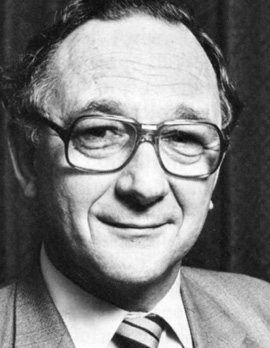
Mr GJ Barnard, MNZCS. President of the New Zealand Computer Society 1975–76.
Graeme Barnard
Graeme Barnard has had a varied career in computers. He was with IBM, first as a sales representative and later as a systems engineer, at a key period, when they were implementing some of the earliest government computer installations. Since 1964 he has been involved with private computer consultancies and companies; today he is head of On-Line Computer Systems Ltd.
He was born in Inglewood, Taranaki, in 1934. His father spent his whole working life in banking; his mother, an excellent pianist, was a school teacher. Graeme grew up in a large house opposite the Moa Dairy Company. He recalls with gratitude both his primary headmaster, Ted Seville, a brilliant teacher of the arts’, who encouraged in Graeme his great love of music; and LJ Wilde, first principal of Feilding Agricultural High School: ‘Such was his standing in New Zealand education that when he retired, he was made Chancellor of the University of New Zealand.’ The school ran two farms, and he helped on them in the holidays: ‘I loved that too … I’m no farmer, but I can walk on to any farm in New Zealand and know what I’m talking about.’
He remembers also the early days of radio, and ‘looking inside the back to see if I could see that man talking to me’. In his teens, his hobby was radio building; buying valves, at ten shillings and sixpence apiece, took ‘round about a whole term’s savings’.
At university he took science, but thinks now that he might have been better off doing engineering; ‘Today I might have taken a Bachelor of Technology degree.’
He was offered a government job, but, ‘the idea of being able to predict one’s future just didn’t really have too much appeal. Quite by chance, I got caught up in a little Agriculture Department project which was very important to my future.’
He took six months to design and build a machine which did a day’s work in 20 minutes — virtually an analogue computer — for which he was awarded ‘ten pounds less tax!’; he decided to resign that same day.
Working with IBM, he found the competitive aspects exciting and challenging, though by today’s standards, competition was gentlemanly. The common characteristic of people who joined was creativity, and they got carried away, working long hours: ‘There used to be a saying, you weren’t really in the data processing business unless you’d seen the dawn rise over the equipment.’ IBM ‘caused things to happen … it was a mighty team. We got hands on, we learnt to master the things, they weren’t frightening any more.’
The inaugural chairman of the Auckland Branch of the Computer Society, he believes the role of the society now is as important as it ever was, especially as ‘a forum of people who ought to know, get their views across, and pick up things they really don’t know … technology and its effect, in general, is rather poorly understood at a political level.’
Today, he says, he looks with real regret at some of the purposeless or trivial uses to which the power of the computer is being put, such as games which become an obsession. ‘The intelligence that’s been programmed into that little chip is attracting the attention of a human mind to the exclusion of all other humans … the damage can be real.’
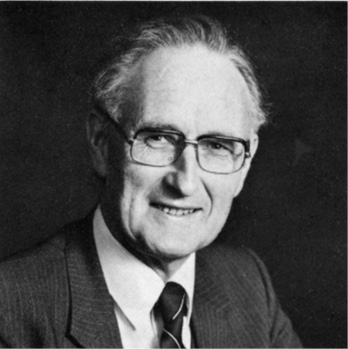
Dr GB Battersby, FNZCS. President of the New Zealand Computer Society 1967–69.-
Bernard Battersby
Bernard Battersby has spent most of his life in Christchurch, where he was born in 1925. His father was an electrical engineer who returned to New Zealand in 1921 following service in the armed forces in World War I. His mother was a war bride. The family lived in Fendalton in a rural environment.
His first school was the Fendalton Open Air School, ‘an innovation at that time: which emphasised fresh air and physical health and fitness’. He had a ‘highly scholastic’ childhood, taking after his father, but his parents did not pressure him to go in any particular direction; he had an interest in finance and commerce so decided to go into accountancy. Because of the war, he had to get as much training as possible before being called up, so he left school at 16, in 1941, to earn his own living.
His first job was as office boy with a public accountant, and he attended university part time, completing the New Zealand Society of Accountants qualification and Bachelor of Commerce degree shortly after turning 19 in 1944 followed in 1946 with a MCom with first class honours in Economics. This resulted in the award of a University of New Zealand travelling scholarship in commerce which he took up in 1948 at the London School of Economics after working his passage to England as a deck hand. The trip took three months, and it was an abrupt change in lifestyle for a young man ‘still very much attached to mother’s apron strings’.
Post-war conditions in Britain were ‘fairly miserable’, but at the LSE he was involved with brilliant academics: ‘One became very modest about one’s accomplishments.’ In 1951 he returned home after completing a doctorate in philosophy in business finance and soon rejoined his old firm as a partner, but also lectured at the university, so that his working day lasted till nine p.m.
In 1957 he became Dean of the Faculty of Commerce at the University of Canterbury, and in 1961 was appointed to the Monetary and Economic Council advising the government on economic policy — which he later chaired. He recalls Robert Muldoon as ‘always very well informed on the economy, and loath to admit that the Council could add to his knowledge’. It was while Bernard was in the United States on a Carnegie Corporation travel grant studying business schools, that he came into contact with computers for the first time. His time at the Carnegie Institute of Technology where the computer business game was ‘invented’, was the turning point which determined his move into computing; he recognised it as ‘something new and exciting that was going to have a tremendous impact on the future’.
The idea of setting up Computer Bureau Limited (now Datacom) in association with Mr PM Hargreaves was ahead of its time — many businessmen were cynical, and the company had its teething troubles: begun in 1965, it did not make its first profit till 1969. The enthusiastic staff of seven often worked round the clock; nobody got rich out of it, but ‘at least they enjoyed it … they found it an intellectual challenge’. Today over 300 people are employed throughout New Zealand
In 1970, Bernard Battersby was elected one of the three Founding Fellows of the Computer Society. He considers the successful establishment of Datacom as a major operator in the computer industry in New Zealand as his major achievement. Datacom has been responsible for a number of ‘firsts’ for the computer industry in New Zealand companies. Many successful members of the computer industry have received their initial training and introduction to computers at Dr Battersby’s hands and he sees the encouragement and support he has given many young people in their computer careers as one of the most satisfying contributions he has made to the industry.
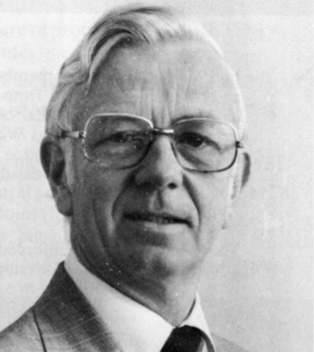
Mr PW Harpham, FNZCS. President of the New Zealand Computer Society 1973–74
Perce Harpham
Unable to make ends meet in the Depression, Perce Harpham’s parents walked off their Poverty Bay farm before he was born in 1932. Building a road on contract, with a pick-and-shovel gang, his father made enough money for a fresh start as a builder.
‘Both my parents were, I think, quite exceptional people … they gave us the great gift of believing that the Harphams were at the top of the pyramid and everyone else was unfortunate. It was a really wonderful piece of confidence to give all their children.’
The youngest of five, he ‘played on childhood illnesses’ to stay home from school frequently, but still did well, and ‘actually used to enjoy doing extra arithmetic at home, working through the examples’.
At secondary school, his health improved; however, he was unhappy because his mother, concerned about injuries, didn’t allow him to play football. CI can sympathise a great deal more with her now.’) In the fifth form he started playing rugby surreptitiously, and ended up as captain of the second 15.
He had chosen to do the new apprenticeship course; ‘There was no tradition or thought of going to university in the family, the horizon was to get University Entrance.’ In the sixth form, helped by his technical teacher, he caught up on mathematics and science and got a special bursary. He decided to do chemical engineering, and in 1955 became the first graduate engineer employed by New Zealand Breweries.
‘The job should have been a young chemical engineer’s dream, but they believed that if you hadn’t spent 15 years shovelling grain out of the mash tub, you couldn’t possibly know anything about brewing.’ He lasted only six months; job-hunting round every factory in town, he became works study officer with Dulux Ltd, where he stayed for 14 years.
He first came across computers on an ICI study trip to England. ‘I was excited by them — and appalled at the amount of work required to get them to do anything. It was the first time most of us had come up against the implacable logic of the machine … that it was always us who were wrong.’
How did others in the company react? ‘Really with a great deal of cynicism. There was a mixture of fear and disbelief, and to some extent hoping that it wouldn’t work.’ He still comes across people who hope computers will go away, ‘or at least won’t impinge on them before they retire’.
In 1968 he established SPL, Systems and Programs Ltd (now Progeni and one of New Zealand’s longest established and most successful software companies). ‘We were often ‘missionaries’ in the software field, but we’ve found it much easier to sell outside New Zealand. In New Zealand’s colonial past, all manufacturing goods had to come on a ship from overseas, and we seem to have been left with the belief that all good things of any complexity come from overseas.’ Perce Harpham, on the other hand, has an unbounded faith in New Zealanders and what they can achieve. His only fear is that by failing to encourage our indigenous computer industry ‘we won’t get the new jobs’ which will be created overseas. He, and his company, are playing a significant role in endeavouring to see that this does not happen.
Gordon Hogg
Gordon Hogg is general manager of Databank, the internationally unique central clearing system for New Zealand banks, which he was mainly responsible for setting up.
Born in Nelson in 1930, he comes of Scottish stock on both sides; his paternal forebears came to New Zealand in 1862, in one of the early ships bringing settlers to Otago. His grandfather bred Clydesdale horses, and Gordon learnt to shoe them when he was barely large enough to lift a horse’s foot.
His father was a policeman, very active in community sports groups. ‘His attitude was that he could give children other things to do, and he made sure they did them — so he’d start a gym, to keep them off the street. If you had a healthy body, you’d end up with a healthy mind.’ Gordon remembers, too, the darker side of life as a policeman’s son: the ‘wave of fear’ through the family when a gunman was on the loose. His father was firm rather than strict; his mother was a shy person who ‘gained more and more confidence over the years’.
Gordon was an avid reader who enjoyed learning, but he hated being forced to do compulsory sports — ‘though the first thing I did when I left school was to join a rugby team’. He was unable to study civil engineering because returned soldiers filled the course, so his aunt offered to put him through medical school; but ‘I had to explain to her, with all her generosity, that I couldn’t stand the sight of blood’. Though he had ‘never given banking a thought’, he joined the Bank of New Zealand, and found he’d made the right move. ‘There was always a challenge there that suited my attitude to life.’ In the early 1950s, ‘things were all going uphill’, and at 22 he was the youngest securities clerk in the bank. By 1962 he was working in London, a year later he was put in charge of computerisation (‘I didn’t know a goddam thing about it’). When Databank was set up in 1967, he became its general manager. Today, he believes, ‘we are only just seeing the thin edge of the wedge’ in computing, which he sees as having a major impact on the whole of society.
Outside his work, one of his main interests is history: ‘You understand a lot about what goes on in the world, and why you yourself do things; in fact it motivates you sometimes to do things differently.’
However, he has never regretted going into banking. ‘It was an excellent training ground, because it taught you disciplines; everything had to balance, everything was geared to perfection. The whole function of banking is one of the utmost integrity, and certainly as far as Databank is concerned, those early attitudes I developed have carried on. If it’s not right, it’s not right. The whole time we’ve been running, we’ve never had any of our output questioned, and that’s a hell of a record.’
Norma Moffett (née Laffey)
Norma Moffett works as Senior Programmer with the Department of Statistics in Christchurch. She was born in Ashburton in 1928, second child in a large family of ten children
Her mother, born Eva Simpson, was ‘an extremely shy person’, but a very hard-working, capable manager, and the family lived quite comfortably through the Depression. However, with such a large family, ‘food, shelter and warmth were the really important things you worked towards, and I think a little of that feeling of sheer survival is still with us all’.
Her parents had no plans for their children’s careers. ‘Their aim was to try to keep you at school for as long as possible, and after that it was entirely up to you what direction you took. We were very fortunate in that most of us had three or four years of high school, which was quite an extensive education in those days. There was no distinction between boys and girls, it was expected that we would all get jobs.’
Norma did very well at school, especially in science and mathematics, but had no idea what work she might do. Her first job, ‘picked out of the paper by my father’, was technician at Wallaceville; but the work was ‘bottom of the barrel — washing test tubes and so on’. Inspired by the graduate researchers who were doing the interesting work, and who included some women, she decided to go to university, and did University Entrance by correspondence in six months. ‘There was no pattern or advice, no one to guide me — no one in our family had been to university before. I didn’t want to go nursing or teaching, the major occupations open to women in those days. I think a tremendous number of women must have been like me, with no idea of what else was available.’
She worked as a waitress to support herself, and graduated in 1954 with a BSc in zoology, then moved to Lincoln to work in animal research. After marrying, she settled in Wellington and took a part-time job; then, in 1960 her boss suggested that she join the Applied Mathematics Laboratory, which was just beginning to get into computers. Here she was part of the team working on the first computer to come into the country, the IBM 650.
She found the work enormously exciting. ‘I used to think, Fancy paying me to have all this fun!’ They worked ‘impossible’ hours, often round the clock. ‘I put on a lot of weight — at two a, m. we’d eat great slabs of chocolate, to give us the boost to go on. It was a matter of pride to get the work done.’ She thinks that it was easier to learn how computers worked then: ‘You were working at such a primitive level, just above machine language, and everything was tangible.’
She missed the job and the people after leaving to have her son in 1965, and looked forward to going back. In 1970 she joined Lane Walker Rudkin, and found that despite the enormous technological progress, her background enabled her to catch up quickly. She stayed until 1980, when she moved to her present position.
She enjoys her work, especially the research aspects; ‘Most of those who started off with me are now working at much more senior levels, and have moved out of programming. I have had opportunities to move but I feel that I personally work best in a team, and preferably in the second place.
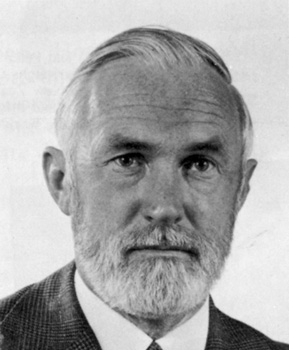
Mr BAM Moon, FNZCS. President of the New Zealand Computer Society 1978–79.
Bruce Moon
Bruce Moon describes himself as ‘that peculiar brew which is a New Zealander’. His maternal grandfather was a successful goldminer, an ‘able, earnest little man’ who dominated five generations of his family; Bruce Moon recalls him and Truby King as ‘two rather fierce old men, glowering at each other across a small peninsula’.
His mother, a skilled musician and artist, was not allowed to develop her talents. At 84, she still drives a car and plays the piano. His father, who fought at Paschendaele, worked for the Union Steamship Company; he was ‘not a happy man, but a man with a sense of his duty … the rage he felt at the deprivations of his own childhood broke through at times’.
Bruce was born in 1930. When he was six, a family move from Christchurch to Bluff was ‘a bit of a culture shock for a small boy from a middle class background’. However, the local primary school had an extraordinarily good range of teachers, ‘perhaps they had to be’. At secondary school, there was wartime drill with obsolete .303 rifles: ‘What we would have done for our country had the Japanese got any nearer, I don’t know but at least we were trying!’
As an adolescent, Bruce Moon envied those who knew exactly what they wanted to do. ‘My interests are diverse; I’m a generalist, not a specialist, though it’s hard for the public to accept that about computer men.’ He won a scholarship, and took his degree in physics and mathematics, then set off to work as a Scientific Officer in Australia ‘ready to dare all’.
Sent to Britain, he found Farnborough ‘a great disappointment … an intellectual slum’, though he developed a great affection for Britain itself and found the work more satisfying after he had wangled a transfer to the Radar Research Establishment, Malvern, where he first became acquainted with a computer. By 1959, he was back in Australia, but he was unable to get his hands on a workable digital computer. Disappointed by the next job he was given (‘I’ve never willingly accepted organisations and arrangements being imposed upon me’), he returned to New Zealand with his wife Margaret and a new baby, and was soon offered a job with IBM (‘Big Blue’). ‘We certainly didn’t live rich — it was hard work.’ When the Computer Society was founded, he joined as an IBM representative.
In 1961 he was appointed as a Senior Lecturer in Mathematics and Director of Computing at Canterbury University. ‘I was very keen that the students got hands-on experience, even if it was only one afternoon each … I soon found that some people have an aptitude for computers, and some don’t — rather like musical ability.’ A sprinkling of people were obsessively involved with computers, ‘but I think in all fairness I didn’t become one of them. Instead I tried to dispel the ‘black art’ concept of computing, and convey something of what it was about to lay people. The real solution is to give a computer to every child to play with, which is just what’s happening now.’
By 1981, the university had become ‘an increasingly circumscribed environment for me’, and he resigned to become general manager of Business Computers Limited. Recently he decided to scale down to a part-time position: ‘While my working days are still far from short, I’ve been for 30 years more or less at the sharp end of computing, and that’s a fair stint for any person.’
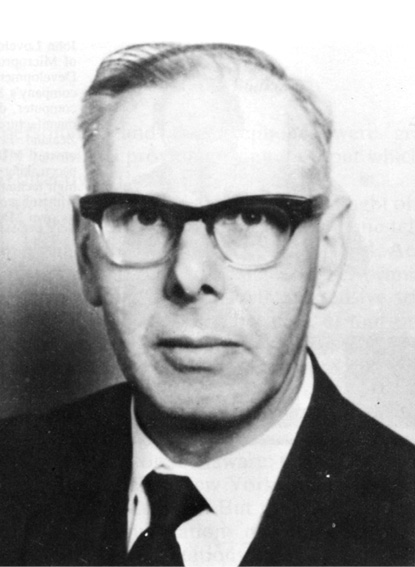
Professor GV Oed, FNZCS. First President of the New Zealand Computer Society 1961–67.
Gordon Oed
A major force behind the formation of the New Zealand Computer Society, and one of its first three Fellows, Gordon Oed has also had considerable influence in the establishment of management systems and information courses in New Zealand universities. He is currently visiting professor at Manchester Business School.
Gordon Oed comes of English, Cornish, German and Northern Irish descent. Both his parents were brought up in Canterbury, and his father was one of the first to take up a holding on the Levels estate, which he farmed for 42 years. Gordon was born in 1918; his teenage years were dominated by the Great Depression, aggravated by the severe drought of 1932, ‘which saw crops ruined and sheep slaughtered to save them from starvation’. Gordon attended the local schools, and loved farm life; his ultimate objective was ‘to do something in the way of agricultural research’, but the tragic death of his eldest brother changed the course of his life.
When the time came for Gordon to leave school he joined the Post Office and stayed with it for 19 years, rising from telephonist at Pleasant Point exchange to Head Office auditor and accountant. As such his work covered research, particularly in the systems area within both the Savings Bank and Accounts Branch Head Offices. His early involvement with EDP, goes back to well before the introduction of New Zealand’s first computer. It stemmed from being attached to what was, at that time, a highly secret and confidential army unit working on what was later to become known as radar. The training he was given in radio physics, together with his accounting and commerce background, provided the foundation for his future involvement in EDP.
‘Towards the end of the war, information started to be released about electronic computers … the concept fascinated me, and I read as much as I could of the work of the pioneers, and what was being done overseas.’
Working in the systems area of the Post Office, Gordon could see the potential of the computer for large organisations. He recommended a Giro-type postal clearing system, and the Labour government passed legislation for its introduction. However, this was repealed by the new National government in 1960, but the concept of the central clearing system was not to be lost to New Zealand. It was later to be developed through the introduction of the Data Banking System.
In 1962, Gordon Oed joined the accountancy department at Victoria University, and has since led a distinguished and varied academic career. Reflecting on the advent of EDP, he says: ‘What was really needed in those days was the ability to think conceptually, a willingness to take risks and to have faith; perhaps we should add the other qualities of hope, and charity for those involved — particularly if things did not work out according to plan!’
Computing power then was a scarce commodity restricted to an elite who could afford it and who had the knowledge and skill to use it. Today the microcomputer has not only made data processing available to many more people but also has added an entirely new dimension to information and at the same time has lowered the level of mathematical and technical knowledge required. Professor Oed is concerned that education has followed technology, rather than vice versa. Because of the ever accelerating rate of change in technology he considers that this own greatest failure has been his inability to persuade educational authorities to promote the concepts of information technology rather than, or in addition to, the narrower technical aspects of computers. With the focus on current technology the inevitable result has been the building of obsolescence into our education system. However, he is optimistic that with the more positive moves in education recently, a more enlightened philosophy will emerge.
Lorin Peko
Lorin Peko is Management Services Officer for the Wellington City Council. He could have retired in 1980, but promised the Town Clerk that he would ‘see the new computer in and on the right path’. He has no intention of getting his own computer when he does retire — ‘I can employ myself very nicely, thank you, between bowls and golf and maintaining my hobbies’ — but first he has to find his own replacement.
Lorin grew up in Dargaville, ‘a very, very introverted close country town’, where his father, Mate, still lives at 92. Mate Peko emigrated from Komin in Yugoslavia in 1909; he worked on the gumfields until World War I, fought in the cavalry, and in 1921 married Elsie Robinson, of Irish descent.
Lorin saw little of his father, who was up at five a.m. working in his magnificent garden, at his menswear shop all day and working at the billiard saloon till eleven every night. On Sundays he took Lorin down to the Yugoslav boarding house. Many Dalmatians spoke no English, and ‘they were inveterate gamblers — they all worked very hard and clung together in that community to survive’. They tended to spoil children, because many had none.
His mother bore seven children in eight years, of whom six died because of the Rh factor. ‘That more or less broke her health — it certainly didn’t help it.’
Lorin was interested in ‘anything that worked’ — clocks, watches, radios. There was no electricity or sewerage in Dargaville then, and only mud roads. A battery radio was their one social contact with the outside world.
He was meant to be a doctor — ‘The Dalmatians would stand in the slush all day and scoop out mud, as long as their sons were getting up’ — but his parents’ disappointment when this didn’t happen was mollified by his success at getting a job in the civil service, which was considered ‘the greatest plum — a job for life’. So in 1940 he went off to the Audit Department in Wellington, and the next year joined the army, where, as a young sergeant ‘in with old lags of twenty-four or five’, he learned to drink and also to gamble, with such success that he lived off his winnings and kept all his pay.
In 1953 he applied for a job in Treasury’s new EDP unit, and ‘although I didn’t even know what it was, they had to explain’, he won it over 1200 applicants. His wife Edvige — for fairly obvious reasons usually known by her second name, Anne, describes the pressure of work setting up the systems: ‘I’ve known him to come home at five a.m., have an hour’s sleep, breakfast, then go back to work … his constant promise was, ‘next week will be better’.’
Lorin saw it as a challenge; ‘The time passed, you weren’t aware of the hours … you always got a tremendous kick out of putting a new machine in … you had to be egotistical, the machine wasn’t going to beat you.’ A strong antipathy to computers was widespread then; today they are accepted as ‘just another office tool’, and New Zealand is one of the most highly computerised countries in the world. However, ‘We shouldn’t go overboard. Computers are not the be-all and end-all of what we need — they are the tail, not the dog.’
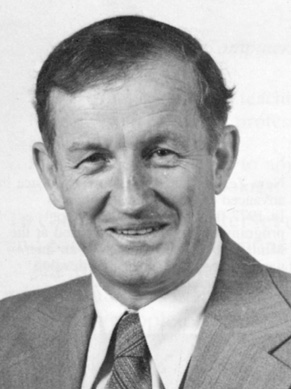
Dr JV Robinson, FNZCS. President of the New Zealand Computer Society 1974–75.
John Robinson
John Robinson was the first male on his father’s side of the family who did not go farming. His paternal grandfather came to New Zealand from Cumberland in the 1860s, and first freeholded land near Geraldine in 1873. Born in 1926 John rode a pony to the local 14-pupil school. His father’s education had finished at twelve; his mother was a trained teacher, and though her family came from Northern Ireland, she had the Scots’ concern for education. They were a close family unit, partly because of their isolation.
It was assumed that the boys would take up farming. John passed Matriculation in his third year of secondary school, which his father saw as a landmark; so he stayed on, getting a scholarship in 1943, despite being kept home for a few months to help overcome the wartime shortage of manpower.
So John went on to Canterbury University — where he became probably the first person in New Zealand to be on television. ‘The first camera was being unpacked and the lecturer setting it up said to me, ‘I wonder if this works — stand still, will you?’ Of course I was unaware of its significance at the time.’
With the help of a DSIR scholarship, he took New Zealand’s first PhD in structural engineering. ‘You learn a lot from doing it yourself and not much from watching anybody else … given that you survive it, you probably come out with strengths that you would not have had otherwise.’
He then joined the DSIR’s Concrete Research Section. It was the era of the big new hydro developments, and John was seconded to Roxburgh to get more practical experience with the Ministry of Works for five years; then he moved to the MOW in Wellington to set up the new experimental arm (‘after a lot of arguing and bureacratic messing about!’) which was fundamentally engineering, rather than research.
While on a fellowship to the Massachussetts Institute of Technology in 1956, he saw the very early Whirlwind (first generation computer), but he was ‘a gawking observer’ only. In a few years, MOW were keen to have their own computer. John recalls its impact: it made it possible to come up, faster, with ‘much better judgement and a much better solution’, at the same time relieving people of ‘a tremendous weight of arithmetic which is just a sheer burden’.
‘They say there are four stages of computing: there’s fear, there’s euphoria, there’s disenchantment, then there’s cold, stark reality!’ In the early 1960s, they were in the ‘euphoria’ stage. But John Robinson also remembers the enormous stress and pressure, working nights and weekends, which took its toll of family life.
He was a founder member of the Computer Society, but he is wary of seeing computing itself as a profession. ‘The computer is just another gadget … and like all tools, people who are capable of using it will stand to gain a lot, people who aren’t will be therefore relatively disadvantaged. I don’t know what the hell you do about it.’
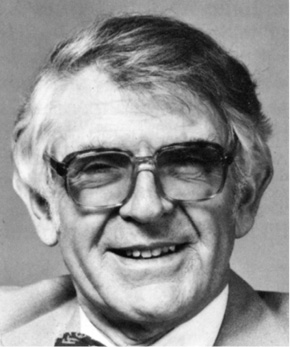
Mr SC Scoular, FNZCS. President of the New Zealand Computer Society 1976–77.
Tolmie Scoular
Tolmie Scoular is a senior partner with the same accounting firm which gave him his first job, as an office boy, in 1944. He was born in Dunedin in 1926; his father was a civil engineer with the Dunedin City Council, and his mother had been one of the first women in Otago to train as a kindergarten teacher.
His father was not a strict disciplinarian, but ‘he held very firm views — he knew right from wrong, and he did not tolerate any wrongs’. His mother also had her own fixed ideas: ‘She is a tremendous woman, still alive, with all the attributes of a Scot — determination and sharpness of mind.’ Her son remembers her as being ‘always there, very supportive — she would never believe anything ill of her children’.
That support was needed when, at the age of ten, Tolmie Scoular contracted polio. ‘From that time onwards, I guess my lifestyle changed a little; but my parents, particularly my father, were determined that I was going to be, and think of myself as, nothing different from an ordinary child. He made sure I participated in everything I could do, and he went to great lengths to ensure that I did.’
After nine months in hospital, Tolmie came out using two walking sticks and with his legs in steel callipers. ‘If you had to have something like that, then I reckon it was about the right age to get it. You’re old enough to understand a little of what’s going on, and young enough not to miss what you’ve never done. Though I had tramped round the paddocks with a football team, I’d never played sport properly, so I never really missed any of that. The friendships I had stayed with me.
As a young man, Tolmie managed to discard his sticks and callipers, and even learnt to dance. ‘I don’t think the doctors ever expected me to do what I’ve done.’ He describes the way he walks as ‘a series of tricks’, using different muscles and balancing himself. Only in recent years has he needed a stick again.
His school years — first at the local primary, then as a boarder at Waitaki Boys’ High — he sees as ‘effective; not unhappy at all’. Although he says he was not at all brilliant. simply persistent, he obtained University Entrance in three years instead of the usual four. He did well in book-keeping, science and mathematics, and wanted to he an engineer, but because of his disability, his father advised him to take up accounting instead.
Systems accounting was his lead into computers — ‘It’s essentially a matter of trying to find the best way of achieving a solution to the problem you have in front of you.’ Lately he has acquired his own micro, and is developing business systems for his own use. ‘Lynn will go off to bed in disgust at midnight, while I’m still trying to solve some little problem.’ He believes that computer technology will improve our quality of life, but at the same time will require a higher level of education, ‘and many people don’t seem to be equipped to cope’. He is concerned, too, about the problem of access to information, ‘that’s the most difficult problem of the lot’.
Paul Walker
Paul Walker is one of the three Foundation Fellows of the Computer Society. His father, Maxwell, was Professor of Modern Languages at Auckland University. Paul was born in 1914, the youngest of six children.
His mother, Frances, was ‘a very pretty, vivacious woman — you couldn’t wish for a better mother’. His father was ‘a little aloof, a product of the Victorian era — this was the way things were in those days, you looked up to your parents. You weren’t allowed to just start chattering at the table, it was speak when you were spoken to.’
Paul’s goal as a child was to earn as much as his father — 1000 pounds a year, a very good salary then. The family lived in a new two-storey house in Herne Bay, (now a motel), with a succession of ‘home helps’ (‘we must have been devils of kids’).
Paul was ‘always a very logical person’, and remembers explaining the solar system when he was seven. At secondary school, teachers encouraged his natural aptitude and interest in mathematics. However, being forced to write right-handed, and go back to using a copybook — ‘an utter disgrace’ — didn’t do him any good: ‘My writing now is shocking.’ Though always near the top, he was ‘never an egghead or a boffin; my reports always said ‘could do better”.
At university, he took a BA and BCom together, and later an MA in mathematics, because ‘I had only average interest in science, and thought accountancy might be a career qualification’. One year he sat (and passed) 18 papers, and was told that the whole examination timetable had been arranged around him.
When he graduated in 1936, the country was ‘just climbing out of the Depression’. After applying for many jobs with no success, he joined the Accounts Division of the State Advances Corporation, beginning a long public service career.
In 1947 he moved to the Public (now State) Services Commission. ‘Organisation and methods were the ‘in-words’ in the 1950s. I’ve always had a bit of a flair for getting good results by working out the most straightforward, logical way to do things, without wasting any time … systems designing is only common sense.’
During his next post, with the Air Department (1954–57), publicity started coming in from overseas about the UNIVAC computer system. ‘By today’s standards, it was absolutely absurd, but logically, it was enthralling.’ In 1957 he transferred to Treasury, in time for the first installation of computer equipment. The long hours setting up the early systems affected family life: ‘You got pretty tetchy, I’m quite sure, although I wasn’t always conscious of doing it.’ He learnt to programme the second Treasury computer because he became so frustrated with being ‘fobbed off’ by the experts the first time.
In 1970 Paul Walker left Treasury to set up Data Enterprises Limited. ‘We’ve seen 25 years of computers here now, and the power has increased around 15,000 times. There are still a lot of managers who haven’t caught up — they’re living in a technology which has gone. To get the full benefit of computers we need a new set of managers who understand the possibilities of this technology, which has simply burst upon us.

In 1985 the Physics and Engineering Laboratory of the Department of Scientific and Industrial Research opened at Gracefield a silicon wafer fabrication plant. In the photograph: aligning the photomask, a wafer before etching in the lithography room. The production of LSI circuits began in 1985.
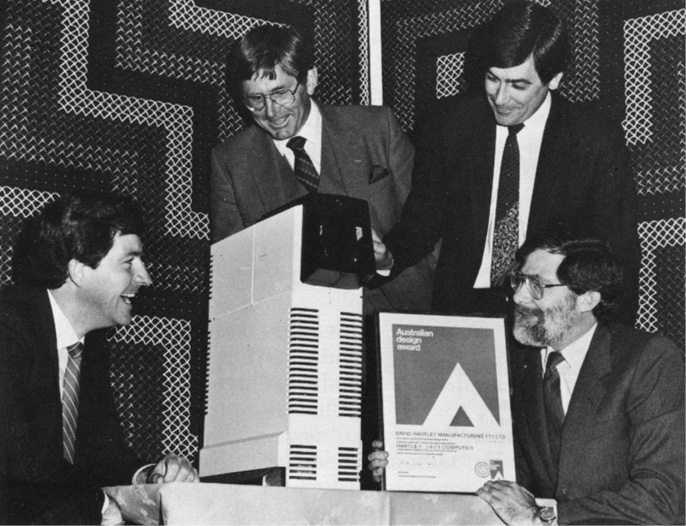
In May 1983 the New Zealand-owned Paxus Information Services Group acquired the David Hartley Computer organization of Australia — the biggest computer manufacturer in Australasia. Shortly afterward the Hartley 3923 system won the Australian Design Award for 1984. In the photograph George Wheeler (left), general manager of Paxus Information Group, with David Hartley (right).